E.M. Horstman1, M. Paul2, D. Bunzel2, B.W. Borsje1, V. Kitsikoudis1, J.M. van Loon-Steensma3, K. Rehdanz4, M-C. Riekhof4. L. Sander5, H. Schwermer4, D. van der Wal6, K. Wijnberg1*
1 University of Twente, Netherlands; 2 Leibniz University Hannover, Germany; 3 Van Hall Larenstein, Netherlands; 4 Kiel University, Germany; 5 Alfred-Wegener-Institute, Germany; 6 NIOZ, Netherlands
* K.M.Wijnberg@utwente.nl
Introduction
The Wadden Sea is the world's largest continuous natural habitat shaped by tidal forces. This unique configuration of coastal and marine ecosystems is of Outstanding Universal Value and was recognised as a UNESCO World Heritage Site in 2009. However, this valuable yet vulnerable ecosystem is increasingly threatened by the impacts of the triple ecological crisis: climate change, biodiversity loss, and pollution. In principle, the natural dynamics of the salt marshes in the Wadden Sea can contribute to the mitigation of and adaptation to the impacts of the triple ecological crisis. Their ability to trap suspended sediments and stabilise soils strengthens their role as natural coastal protection and facilitates adaptation to sea level rise due to climate change. At the same time, salt marshes serve as important pollutant and carbon sinks, whilst delivering outstanding biodiversity. However, most Wadden Sea salt marshes have undergone anthropogenic use for centuries, with a strong focus on coastal protection and agriculture. With SALTGARDEN we aim to move away from managed and static salt marshes, towards diverse and dynamic salt marshes of different successional stages -referred to as ‘SALTGARDENS’- in order to improve the functioning and resilience of the vegetated coastal ecosystems in the Wadden Sea.
Objective and Methods
The SALTGARDEN project explores new restoration concepts that aim to maintain the ecological integrity of salt marsh systems and strengthen their associated ecosystem services. Our desired societal impact is a paradigm shift in the management of salt marshes towards new ecological guiding principles that we name Nature-based Gardening (NbG). This shift requires social and political acceptance. SALTGARDEN therefore aims to co-create socially and politically accepted NbG strategies to establish adaptive and resilient salt marshes through sustainable management, thereby enabling and enhancing their natural dynamics. For this, it needs to be widely understood that coastal spatial design should not only consider the current state of salt marshes, but also their possible future states. In the project, different plant communities and successional stages will be tested in mesocosms for their vulnerability, resilience and the functioning of their ecosystem services under the influence of different stressors. Numerical model predictions and remote sensing observations will be coupled with socio-economic assessments to predict future changes in the functionality and persistence of dynamic coastal landscapes. Lastly, NbG strategies to promote dynamic salt marshes will be co-created together with stakeholders, to enable adaptive coastal landscapes and to consolidate this new paradigm at the policy level.
Results
The intended results of the SALTGARDEN project will provide quantitative insights in the dynamics and resilience of managed and static salt marshes in comparison to the functioning of biodiverse and dynamic salt marshes. The NbG strategies will enable such biodiverse and dynamics salt marshes, creating landscapes that deliver the highest ecological value and ecosystem services, whilst being adaptive and resilient in the long term. These salt marsh landscapes will also enhance the aesthetics and natural beauty of the Wadden Sea ecosystem, contributing to the Outstanding Universal Value of this World Heritage site.
By promoting the establishment of biodiverse and dynamic salt marshes, we consider the NbG approach to be a progression of the established paradigms of ‘REstoration’, ’REcreation’ or ‘REbuilding’. The project thus questions whether these RE-created past ecosystems are sufficiently adaptive and resilient in the face of the present triple ecological crisis, and at the same time introduces the biodiverse SALTGARDENS as future-proof salt marshes with a solid contribution to the Outstanding Universal Value of the Wadden Sea. We believe that NbG can strengthen the ecological status and ecosystem services of the Wadden Sea salt marshes for future generations.

Planned impact and approach of the SALTGARDEN project (illustration by Joost Fluitsma).










